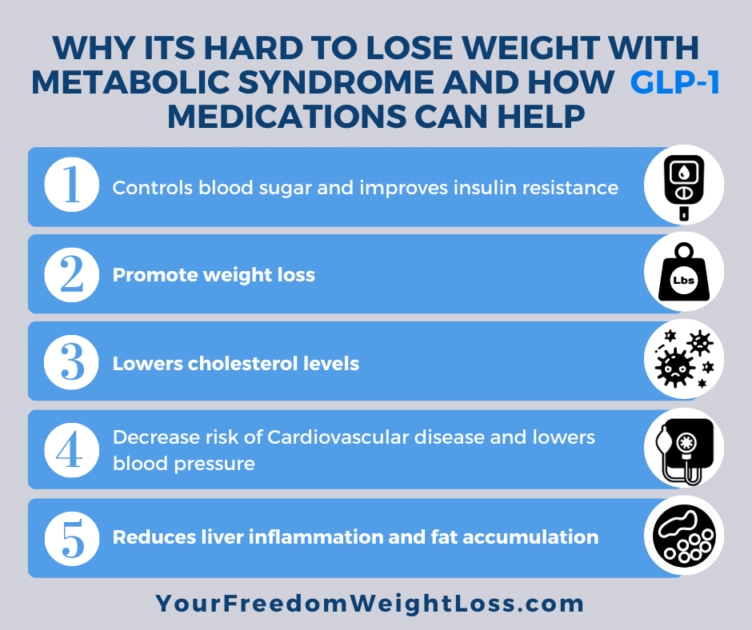Why is it so hard to lose weight with metabolic syndrome?
- Insulin Resistance
Insulin resistance is a hallmark of metabolic syndrome. It occurs when cells become less responsive to the effects of insulin, leading to high blood sugar levels. Insulin resistance makes it harder for the body to utilize glucose for energy and promotes fat storage.
2. Hormonal Imbalances
Metabolic syndrome often involves hormonal imbalances, such as elevated levels of insulin and cortisol (the stress hormone). These imbalances can disrupt the body’s natural metabolism and promote fat accumulation, especially around the abdominal area.
- Increased Fat Storage
Metabolic syndrome is associated with a higher tendency to store fat, particularly visceral fat (fat around the abdominal organs). Visceral fat is metabolically active and releases inflammatory substances that can further contribute to insulin resistance and other metabolic abnormalities. This type of fat is often stubborn and resistant to weight loss efforts.
- Medications
Certain medications commonly prescribed to manage metabolic syndrome, such as insulin, may promote weight gain or make it harder to lose weight.
How GLP-1 Medications Help Manage Metabolic Syndrome
What are GLP-1 or GLP-1/GIP medications?
GLP-1 (glucagon-like peptide-1) is a hormone produced by the gut after a meal. It plays a vital role in regulating blood sugar levels by stimulating the release of insulin and suppressing glucagon, a hormone that raises blood sugar. In people with metabolic syndrome, GLP-1 production and signaling may be impaired. GLP-1 medications work by mimicking the action of this hormone, helping to regulate blood sugar levels, and providing additional health benefits. GIP is glucose-dependent insulinotropic polypeptide. While GIP’s role in glucose metabolism is similar to GLP-1, it also has effects on appetite regulation and energy balance that may contribute to weight loss.
GLP-1 medications include Semaglutide (brand names Ozempic or Wegovy). Tirzepatide (brand name Mounjaro) is a GLP-1/GIP medication.
How GLP-1 Medications Help Manage Metabolic Syndrome
Blood Sugar Control
One of the key features of metabolic syndrome is insulin resistance, which means the body’s cells become less responsive to the effects of insulin. GLP-1 medications can help address this issue by promoting insulin secretion, enhancing insulin sensitivity, and reducing glucagon release. These actions lead to improved blood sugar control, preventing spikes and dips in glucose levels. By keeping blood sugar levels within a normal range, GLP-1 medications reduce the risk of developing type 2 diabetes and its complications.
Weight Management
Excess weight, particularly abdominal fat, is strongly associated with metabolic syndrome. GLP-1 medications have demonstrated significant benefits in weight management. These medications slow down the emptying of the stomach, creating a feeling of fullness and reducing appetite. As a result, individuals taking GLP-1 medications tend to eat less and experience weight loss. Studies have shown that these medications can help individuals with metabolic syndrome lose weight and maintain long-term weight reduction, thereby improving overall metabolic health.
Cardiovascular Benefits
Individuals with metabolic syndrome are at an increased risk of developing cardiovascular diseases such as heart attacks and strokes. GLP-1 medications have been shown to cause a remarkable reduction in the risk of major adverse cardiovascular events. They help improve cardiovascular health by lowering blood pressure, reducing inflammation, improving arterial function, and decreasing the risk of blood clots.
Additional Health Benefits
GLP-1 medications provide several other health benefits beyond blood sugar control, weight management, and cardiovascular protection. They can improve lipid profiles by decreasing triglyceride levels and increasing high-density lipoprotein (HDL) cholesterol levels. GLP-1 medications also have positive effects on liver health by reducing liver fat accumulation and inflammation. Furthermore, they may improve kidney function and reduce the risk of diabetic kidney disease, a common complication of metabolic syndrome and type 2 diabetes.
Conclusion
Metabolic syndrome is a complex condition that requires a comprehensive approach for management. While lifestyle modifications remain the cornerstone of treatment, GLP-1 medications, like Semaglutide and Tirzepatide, have emerged as a valuable tool in the management of metabolic syndrome. These medications provide benefits beyond blood sugar control and contribute to weight loss, cardiovascular protection, improved lipid profiles, and potential kidney benefits. However, it is important to note that GLP-1 medications should be used as part of a comprehensive treatment plan including lifestyle changes, healthy diet, and exercise.




